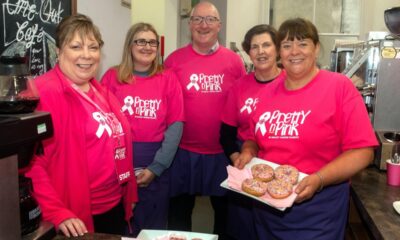Business
Chapel Down’s Stock Surges After Promising Harvest Report

Chapel Down, England’s largest winemaker, experienced a notable surge in stock value this week. The company’s shares increased by 10% following the release of a positive harvest update. Currently priced at 38 pence, Chapel Down’s market capitalization stands at approximately £66 million, representing a significant decline of 50% since last summer.
Record Harvest Yields
The Kent-based vineyard, which spans 1,018 acres, has reported an impressive yield of 2,882 tonnes from the recent September/October harvest. This figure marks a substantial increase from 1,852 tonnes in 2024 and is 15% above the five-year average yield of 3.7 tonnes per acre. The warm summer weather has contributed positively to the grape quality, with Chapel Down stating that the conditions have produced grapes with “a good balance of ripe fruit flavors for complexity and texture.”
This latest harvest represents the second highest yield in the company’s history and moves Chapel Down closer to its ambitious goal of capturing a 1% share of the global Champagne market by 2035. According to CEO James Pennefather, this target could translate into approximately £75 million in revenue.
Sales Growth and Market Confidence
Chapel Down’s board expressed confidence in meeting market expectations for 2025, projecting revenues of £19 million, which would indicate a year-on-year growth of around 16%. In June, the company’s net sales rose by 11% to £7.9 million, largely due to a 30% increase in retail sales. International distributions also saw a significant boost, with a 17% rise attributed to new partnerships, particularly with Jackson Family Wines in the US and another partner in Norway.
While traditional wine-producing countries like France, Italy, and Spain have faced challenges from climate change, English vineyards, including Chapel Down, have benefitted from shifting weather patterns. However, with UK pubs and restaurants currently under pressure, the company may need to focus on expanding its international sales to sustain future growth.
Despite these positive developments, the capital-intensive nature of winemaking presents challenges. Chapel Down’s net debt increased to £11.3 million as the company invested in new vineyards and built inventory from the previous year’s harvest. While the firm has £20 million in headroom, it is crucial to manage debt responsibly as further growth may necessitate additional financing, which could dilute existing shareholders.
Chapel Down presents an intriguing opportunity for investors willing to accept the associated risks. While the potential for significant returns exists, particularly if the company continues to grow its market share, current earnings forecasts suggest that the company may face either a small loss or modest profit this year.
For investors considering a stake in Chapel Down, the current price point offers an entry into a market that has shown resilience in the face of climate challenges. However, as with any investment, careful analysis and consideration of future risks are essential.
The developments surrounding Chapel Down highlight the dynamic nature of the wine industry in the UK and the potential for growth in an evolving market landscape.
-

 Entertainment2 months ago
Entertainment2 months agoAnn Ming Reflects on ITV’s ‘I Fought the Law’ Drama
-

 Entertainment3 months ago
Entertainment3 months agoKate Garraway Sells £2 Million Home Amid Financial Struggles
-

 Entertainment2 months ago
Entertainment2 months agoCoronation Street’s Carl Webster Faces Trouble with New Affairs
-

 Health2 months ago
Health2 months agoKatie Price Faces New Health Concerns After Cancer Symptoms Resurface
-

 Entertainment2 months ago
Entertainment2 months agoWhere is Tinder Swindler Simon Leviev? Latest Updates Revealed
-

 Entertainment3 months ago
Entertainment3 months agoKim Cattrall Posts Cryptic Message After HBO’s Sequel Cancellation
-

 Entertainment2 months ago
Entertainment2 months agoOlivia Attwood Opens Up About Fallout with Former Best Friend
-

 Entertainment2 months ago
Entertainment2 months agoMasterChef Faces Turmoil as Tom Kerridge Withdraws from Hosting Role
-

 Entertainment3 months ago
Entertainment3 months agoSpeculation Surrounds Home and Away as Cast Departures Mount
-

 Entertainment3 months ago
Entertainment3 months agoMarkiplier Addresses AI Controversy During Livestream Response
-

 World2 months ago
World2 months agoCole Palmer’s Mysterious Message to Kobbie Mainoo Sparks Speculation
-

 Entertainment2 months ago
Entertainment2 months agoITV’s I Fought the Law: Unraveling the True Story Behind the Drama





















